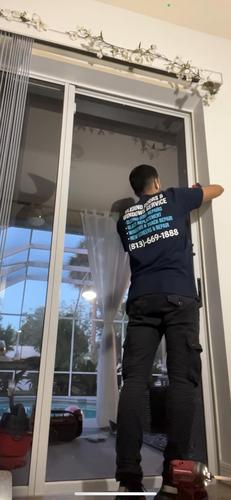Glass doors bring a touch of class and practicality to your space, but let’s face it, they’re not immune to the occasional scratch or break. Dealing with a shattered glass door, whether a minor chip, significant crack, or even hardware that won’t cooperate, is vital to keeping your space safe and visually appealing. Let’s dive into the ins and outs of glass door repair, tackling the simple fixes you can do yourself and knowing when it’s time to ring up a pro.

Understanding Common Glass Door Issues¶
Glass doors are susceptible to various issues, ranging from minor cosmetic damage to significant structural problems. Some common issues include:
- Cracks and Chips: Cracks and chips can occur due to impact or stress on the glass. Although they might not look like much, even tiny cracks can weaken the whole structure of a door and raise some serious safety concerns.
- Broken Hardware: Hinges, handles, and locks tend to give out after a while, so doors start acting up. When a door’s hardware breaks, it doesn’t just make the door demanding to use and leaves your space less secure.
- Fogging or Moisture Buildup: Fogging or moisture buildup between the glass panes indicates a failed seal, which can reduce energy efficiency and detract from the door’s appearance.
- Sticky or Stiff Sliding Mechanisms: Sliding glass doors may become difficult to open or close due to dirt, debris, or misalignment of the tracks.
DIY Glass Door Repair Solutions¶
While some glass door repairs require professional intervention, many minor issues can be addressed with DIY solutions. Here are some tips for repairing glass doors yourself:
Repairing Small Cracks and Chips: You can use a glass repair kit containing resin and curing agents for small cracks and chips. Follow the manufacturer’s instructions carefully to fill the crack and restore the integrity of the glass.
Replacing Broken Hardware: If hardware components such as hinges or handles are broken, they can often be replaced with new parts. Be sure to choose hardware that matches the style and specifications of your door.
Cleaning and Lubricating Sliding Mechanisms: Sticky or stiff sliding mechanisms can usually be remedied by cleaning the tracks with a mild detergent and lubricating them with silicone spray or lubricating oil.
Sealing Fogged Glass: If you notice fogging or moisture buildup between the glass panes, you may be able to remove and reseal the glass unit yourself. Although you might give it a shot, fixing those foggy windows is no walk in the park—you’ll need the right tools and some solid skills to nail it.
When to Call a Professional¶
While DIY repairs can be effective for minor issues, some glass door problems are best left to the professionals. Consider calling a professional glass repair service if:
- The damage is extensive or poses a safety risk.
- You lack the necessary tools, skills, or experience to perform the repair.
- You’ll need specific tools or materials not currently available for this repair.
- The door is still under warranty, and DIY repairs may void the warranty.
Adapting a book into a movie is challenging, as it has to live up to the vibrant scenes readers have conjured in their minds, balancing faithfulness to the text with cinematic flair.
Keeping your glass doors in top shape is critical—it’s more than looks; it’s ensuring that your space is safe and secure. Get to know the usual hiccups with your glass doors, dive into some home fixes when you can, and don’t hesitate to call the pros when things get out of hand—that way, your doors will stay sharp and sturdy for ages.
Quick action on glass door troubles—like cracks, worn-out parts, or foggy panes—is essential to keep your doors looking sharp and working smoothly. Armed with the strategies and fixes in this guide, you are you’reet to handle any glass door repair and keep those doors looking great for years.

